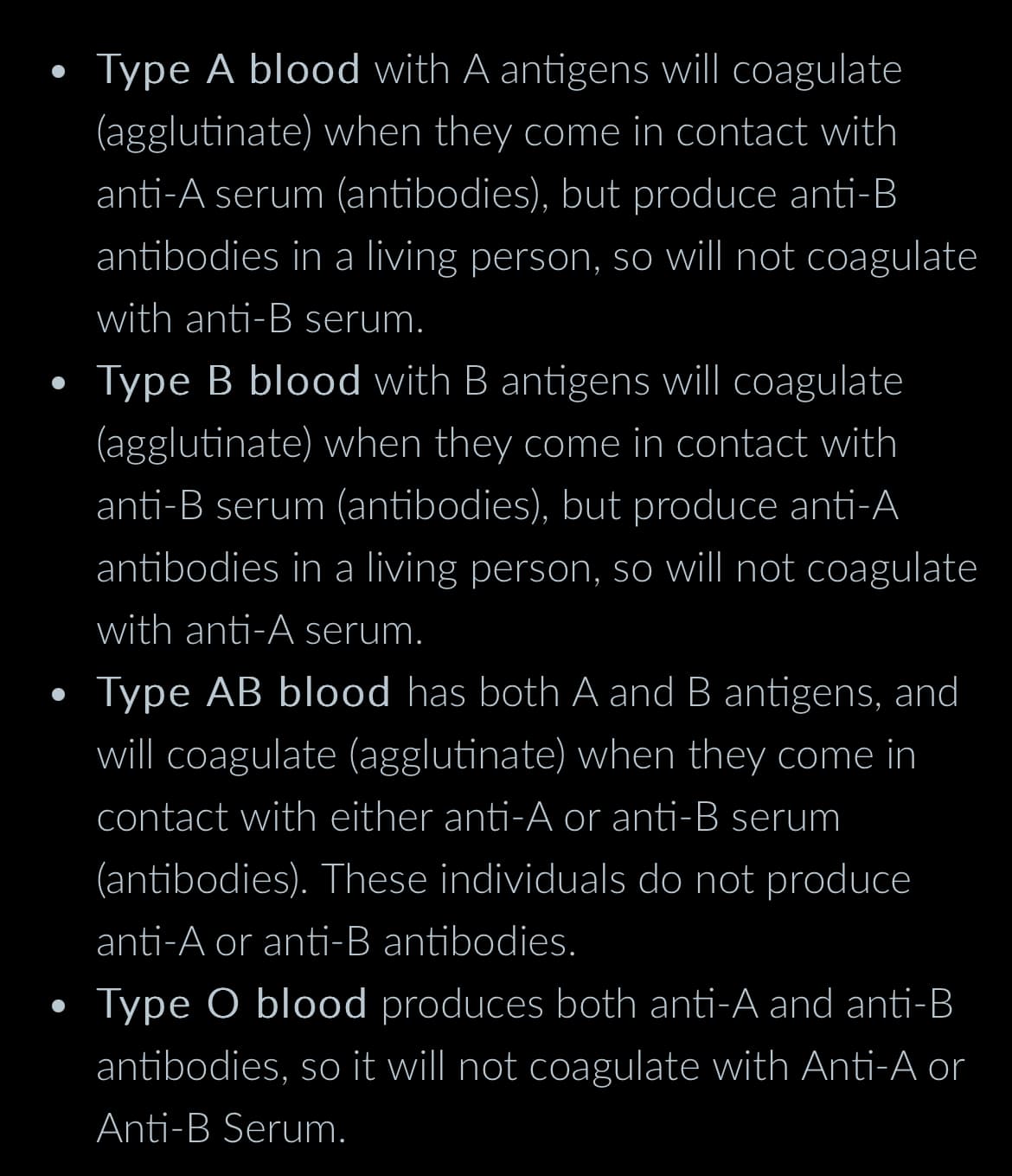Type A blood with A antigens will coagulate (agglutinate) when they come in contact with anti-A serum (antibodies), but produce anti-B antibodies in a living person, so will not coagulate with anti-B serum. Type B blood with B antigens will coagulate (agglutinate) when they come in contact with anti-B serum (antibodies), but produce anti-A antibodies in a living person, so will not coagulate with anti-A serum. Type AB blood has both A and B antigens, and will coagulate (agglutinate) when they come in contact with either anti-A or anti-B serum (antibodies). These individuals do not produce anti-A or anti-B antibodies. Type O blood produces both anti-A and anti-B antibodies, so it will not coagulate with Anti-A or Anti-B Serum.
Type A blood with A antigens will coagulate (agglutinate) when they come in contact with anti-A serum (antibodies), but produce anti-B antibodies in a living person, so will not coagulate with anti-B serum. Type B blood with B antigens will coagulate (agglutinate) when they come in contact with anti-B serum (antibodies), but produce anti-A antibodies in a living person, so will not coagulate with anti-A serum. Type AB blood has both A and B antigens, and will coagulate (agglutinate) when they come in contact with either anti-A or anti-B serum (antibodies). These individuals do not produce anti-A or anti-B antibodies. Type O blood produces both anti-A and anti-B antibodies, so it will not coagulate with Anti-A or Anti-B Serum.
Human Heredity: Principles and Issues (MindTap Course List)
11th Edition
ISBN:9781305251052
Author:Michael Cummings
Publisher:Michael Cummings
Chapter17: Genes And The Immune System
Section: Chapter Questions
Problem 14QP
Related questions
Question
1. Suppose that the three samples are from two parents and their child.
Which individuals are the parents? Which individual is the child? How do you know?
Parent 1 =
Parents 2 =
Child =
2.
What genotype must each individual have for this scenario to be possible?
Parent 1 =
Parent 2 =
Child =
please answer all of them now.

Transcribed Image Text:Type A blood with A antigens will coagulate
(agglutinate) when they come in contact with
anti-A serum (antibodies), but produce anti-B
antibodies in a living person, so will not coagulate
with anti-B serum.
Type B blood with B antigens will coagulate
(agglutinate) when they come in contact with
anti-B serum (antibodies), but produce anti-A
antibodies in a living person, so will not coagulate
with anti-A serum.
Type AB blood has both A and B antigens, and
will coagulate (agglutinate) when they come in
contact with either anti-A or anti-B serum
(antibodies). These individuals do not produce
anti-A or anti-B antibodies.
Type O blood produces both anti-A and anti-B
antibodies, so it will not coagulate with Anti-A or
Anti-B Serum.
Expert Solution
This question has been solved!
Explore an expertly crafted, step-by-step solution for a thorough understanding of key concepts.
Step by step
Solved in 2 steps

Recommended textbooks for you

Human Heredity: Principles and Issues (MindTap Co…
Biology
ISBN:
9781305251052
Author:
Michael Cummings
Publisher:
Cengage Learning

Human Physiology: From Cells to Systems (MindTap …
Biology
ISBN:
9781285866932
Author:
Lauralee Sherwood
Publisher:
Cengage Learning

Human Heredity: Principles and Issues (MindTap Co…
Biology
ISBN:
9781305251052
Author:
Michael Cummings
Publisher:
Cengage Learning

Human Physiology: From Cells to Systems (MindTap …
Biology
ISBN:
9781285866932
Author:
Lauralee Sherwood
Publisher:
Cengage Learning